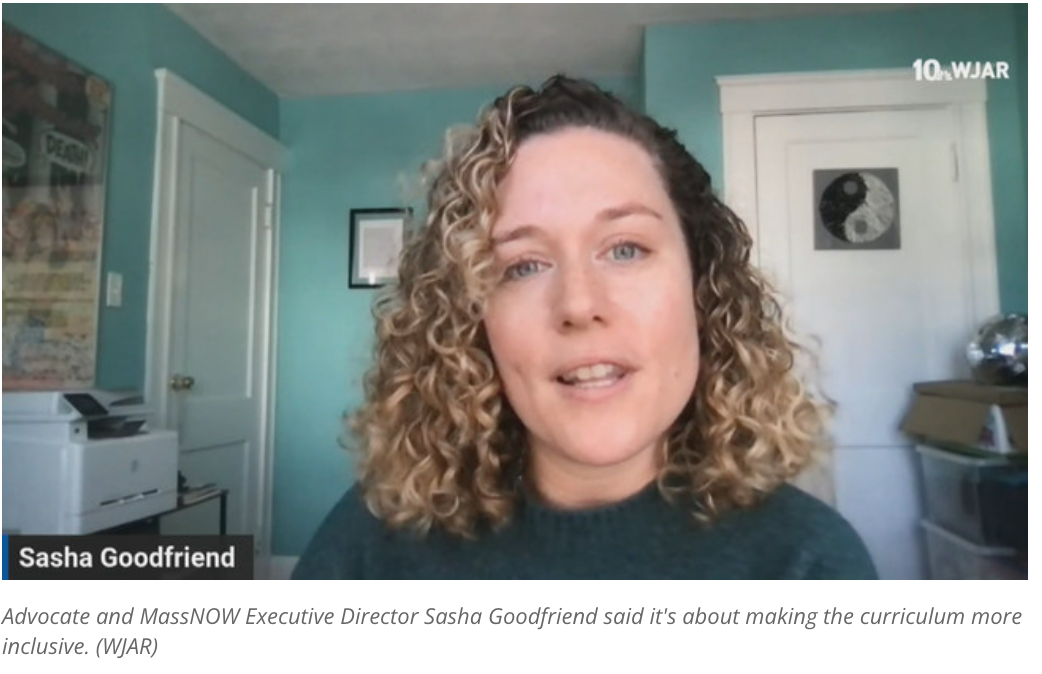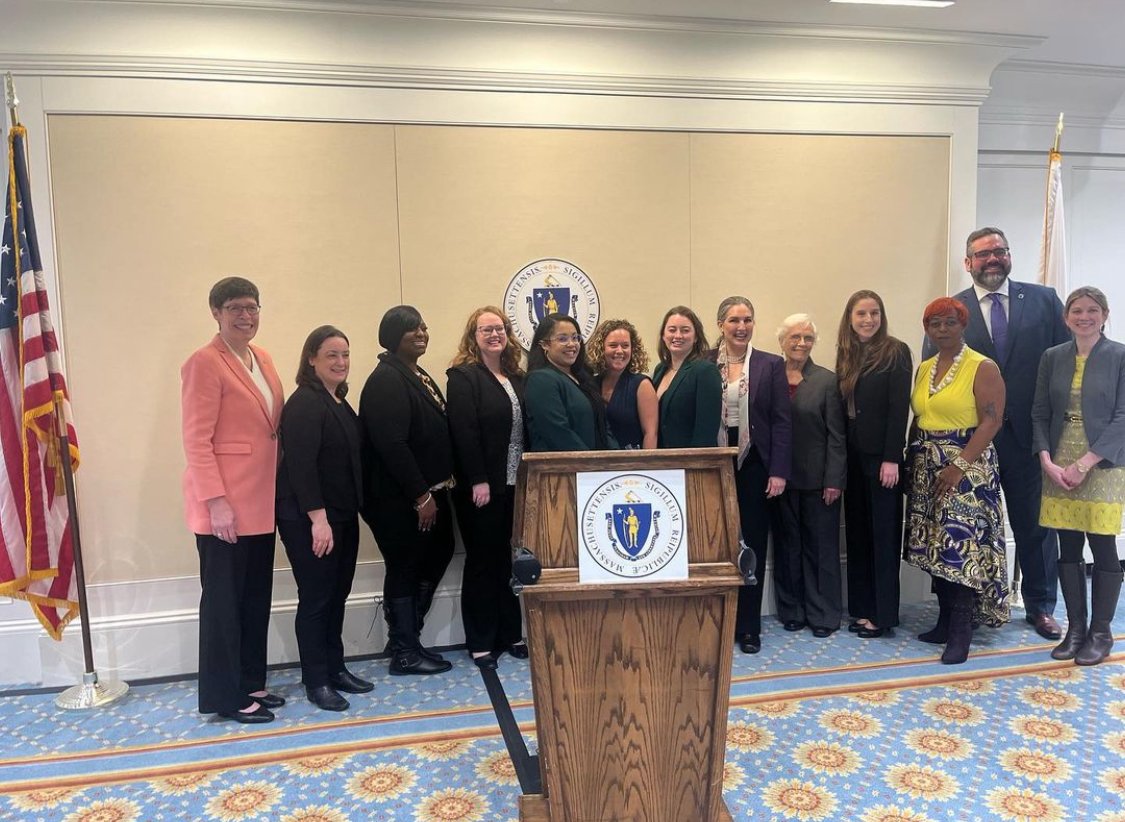LEGISLATIVE UPDATE
68 Endorsed Bills!
BILLS WITH NO ACTION: 21
NOT TOO LATE:
BILLS WITH EXTENDED COMMITTEE DEADLINES: 26
ON THE MOVE!
BILLS REPORTED FAVORABLY OUT OF COMMITTEE: 12
BILLS PASSED ON THE SENATE FLOOR : 8
BILLS PASSED ON THE HOUSE FLOOR: 10
BILLS IN CONFERENCE COMMITTEE: 1
BILLS IN HOUSE WAYS AND MEANS: 9
BILLS IN SENATE WAYS AND MEANS: 8
PASSED:
BILLS PASSED AS A PART OF BUDGET FISCAL YEAR ‘24: 1
BILLS MASS NOW HAS SUBMITTED TESTIMONY FOR THIS SESSION: 12
It’s the second year in the 193rd Legislative session, and we have just a few more months before the formal session ends on July 31st. Now that we are on the other side of the Joint Rule 10 deadline for Committees to vote bills out favorably, we wanted to share an update on our 68 endorsed legislation on our feminist agenda.
This is the largest and most intersectional legislative agenda in Mass NOW’s history, representing a multi-pronged strategy needed to achieve a feminist democracy in the Commonwealth. We’ve included a glossary of what each status means below. To learn more about the legislative process, we recommend this overview from Mass Legal Services.
Overall, about a third of the bills on our legislative agenda have not been reported favorably out of Committee, and a third more are in jeopardy of the same fate. Check out the full list of bills awaiting a vote out of committee and write the committee to urge they’re reportedly favorably!
Mass NOW’s principal bill, the I AM bill (Increase Access to Menstrual Products) passed the Senate floor unanimously in October, and has remained in the House Ways and Means Committee. Join us in urging House Leadership to bring the I AM Bill to a vote in the committee before the end of the formal session. Thank you to everyone who came out to our IGNiTE the Capitol Advocacy Day and met with legislators and asked to bring I AM to a vote.
Mass NOW has been a founding member of the The Healthy Youth Act (HYA) Coalition for over 10 years, which would take much needed steps to make sexual health comprehensive. Earlier this month, right before the Joint Rule 10 deadline for bills to be reported out of committee, the HYW was voted favorably out of the Education Committee and is now in the House and Senate Ways and Means Committees. This past summer, the Massachusetts Board of Education voted to approve new Health Education Frameworks for the first time in 24 years – however, we still need to pass the HYA!
The HYA ensures that the updated frameworks are not merely suggestions but minimum standards, calling for data reporting to DESE every two years on what curriculum is being taught. Thank you to our advocates who joined us for a literature drop at the State House and writing legislators to finally pass this common-sense bill. The Massachusetts Senate voted to pass the Healthy Youth Act on February 29, 2024, check out this interview with Mass NOW Executive Director about the vote on NBC10 here.
The Parents Running for Office (PRO) Bill would enable PAC funds for childcare, an essential campaign expense for working parents. This bill remains in the Committee on Election Laws which extended their reporting period to May 28, 2024. In January, Mass NOW joined the Massachusetts Commission on the Status of Women, Massachusetts Caucus of Women Legislators, the Massachusetts Women’s Political Caucus, YW Boston, and Vote Mama to host a press conference at the State House. Check out the OpEd by the Boston Globe Editorial Board, Allow the use of campaign funds for childcare.
Parity on Boards the 4th and final piece of legislation on the Advocacy Day agenda. An act to increase diversity on public boards, has also received a favorable committee report! This bill would ask that every public board and commission try to have at least 50% female, 30% underrepresented minority groups or LGBTQ+ identifying folks as members. The bill, along with I AM, is waiting in House Ways and Means to be brought to a vote.
Wage Transparency Bill has had massive success this session. Passing through both the House, and Senate, the bill is in the final steps of crossing Ts and dotting Is and is nearing becoming a full law. The bill would require employers to provide salary ranges when hiring and require them to share their EEOC (equal employment opportunity commission) data with the state secretary. This bill has passed through nearly all stages of a lengthy process and thanks to the advocacy of many, the Commonwealth of Massachusetts is very close to passing important gender pay equity legislation.
A few of our priority bills were also passed as part of the budget in fiscal year 2024 and through Governor’s orders. Despite not passing the legislative process, the principles of these bills will be implemented and enforced as a part of the Governor’s final budget. Proper resources will be allocated to execute the language and purposes of these bills. The bill passed as part of the budget is the Hormonal Contraceptives act. This bill will allow registered pharmacists to prescribe and dispense hormonal contraceptive patches and self administered oral contraceptives to anyone despite whether they have received a similar prescription in the past. Our priority bills that were passed through Governor’s orders were an act to update licensed birth center regulations and an act to increase access to midwifery care. The purposes of this bill are to ensure birthing people have access to the best form of care they need. These bills have not passed the legislative process, however, the governor has ordered MassHealth and the Board of Public Health to review their regulations and change them in accordance with the proposed bills.
Glossary
“Reported Favorably out of Committee”: After a joint legislative hearing, the assigned committee comes together to decide whether a bill is deemed “ought to pass” or “ought not to pass” (ought to pass being a “favorable” report).
“Passed on the Senate Floor”: A bill is placed into “the orders of the day” meaning it is on the agenda for debate and vote on the senate floor; And is passed with a favorable roll call (more Yeas than Nays). The bill then moves to the Senate committee on Ways and Means.
“Passed on the House Floor”: A bill is placed into “the orders of the day” meaning it is on the agenda for debate and vote on the house floor; And is passed with a favorable roll call (more Yeas than Nays). The bill then moves to the House committee on Ways and Means.
Conference Committee: After a bill passes both the senate and the house, the bill moves into a committee with members of both houses to agree upon a final draft. As it is common for house and senate bills to differ slightly, they must agree upon one version.
Joint Rule 10: This rule states that bills that have not had a favorable report or deadline extension from their committee by the February 7th deadline will go no further in the legislative process for the current session.
“No Action”: Bills that did not receive a favorable report or extension by the deadline.
Extended Committee Deadline: Committees can also decide to extend the joint rule 10 deadline, and give themselves more time to decide whether or not to give bills favorable reports.
Third Reading: After a bill passes the house or the senate the bill goes through 3 “readings”. The 2nd reading occurs after the bill has passed and is debated on, and amendments are proposed, then it is kicked to 3rd reading. Where more debate occurs and more amendments are proposed.
Passed as part of the Budget Fiscal Year ‘24: Instead of passing as legislation, the bill is essentially presented as budget amendments, and passed in the final budget of upcoming fiscal year 2024.
House Ways and Means: TThe committee bills are sent to after passing through their assigned committee with a favorable vote. This committee then decides how much a bill will cost, how to fund, or execute a bill, and then decides which bills are called to a vote on the House floor.
Senate Ways and Means: The committee bills are sent to after passing through their assigned committee with a favorable vote. This committee then decides how much a bill will cost, how to fund, or execute a bill, and then decides which bills are called to a vote on the Senate floor.







